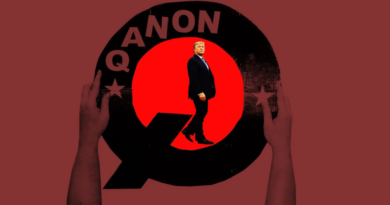Opinion: Dreyfus affair reveals what it takes to face QAnon conspiracies

On a wintry March day in 1896, the newly appointed director to the French Army’s Statistical Bureau, Colonel Marie-Georges Picquart, was sorting through a fresh pile of trash on his desk. The bureau was, despite its bland name, the military’s counter-intelligence office, while the garbage was hardly garbage, but instead the daily harvest from the trash pails at the German Embassy.
What began that ordinary day, however, speaks to our current moment. As bizarre as the conspiratorial online fantasies of QAnon seem, its sordid stew of anti-Semitic ideas and images are old. So we can look to the past for warning signs and inspiration.
In France that morning 125 years ago, the director discovered a crumpled telegram from Max von Schwartzkoppen, the German military attaché, to a French officer named Esterhazy. We are not, warned the attaché, getting our money’s worth in military information. Digging up a recent memo written by Esterhazy, the stunned director compared its handwriting to a letter sent to the attaché two years earlier that contained vital secrets. The handwriting was identical, yet the military authorities pinned the crime of treason not on Esterhazy, but a different French officer who had since been serving a sentence of life imprisonment on Devil’s Island.
Suddenly, this day was not like any other. Picquart’s response to his startling discovery helped to transform a judicial matter into the existential crisis we know as the Dreyfus Affair. Named after Alfred Dreyfus, the French Jewish officer wrongly accused of treason, the affair opened wide a fault line running through France. One side were the Dreyfusards who privileged reason and believed France’s identity was defined by the abstract principles of equality and liberty.
On the other side, however, were the anti-Dreyfusards who privileged the irrational and insisted that France’s identity was rooted in la terre et les morts — the soil that countless generations had cultivated and in which countless ancestors were buried. For the first camp, objective truths based on incontrovertible evidence proved Dreyfus’s innocence; for the second camp, subjective truths based on the indelible otherness of Jewish people proved Dreyfus’s guilt. In effect, alternative versions of reality faced off against one another.
Enter Picquart, the man picking through the German trash. Like Dreyfus, he hailed from Alsace and excelled at engineering and military school. Unlike Dreyfus, he was Catholic and conservative. He was also an unrepentant anti-Semite who, like his fellow officers, believed that Dreyfus was a traitor. Yet upon discovering new evidence that incriminated Esterhazy, Picquart did not retreat to his old prejudices. Instead, he reported his finding to his superior officer, General Charles-Athur Gonse, in the expectation that the investigation would be reopened.
Though the general shared Picquart’s contempt for Jewish people, he did not share his respect for reality. When Gonse asked why he cared if “this Jew remains on Devil’s Island,” Picquart blurted: “Because he is innocent!” Ordered by his commander to forget what he had found, Picquart replied: “I will not carry this secret with me to the grave.” Though suddenly reassigned to a desert outpost in Tunisia, Picquart persisted. Returning to France, he testified on Dreyfus’s behalf. His commanders rewarded Picquart by charging him with forging evidence — a richly ironic accusation as the army had done the same to fatten their case against Dreyfus — and tossed him into prison.
With the publication, shortly after, of Emile Zola’s “J’Accuse…!” the military’s conspiracy and government’s complicity were brutally exposed. In short order, Dreyfus was retried, pardoned and exonerated, as was his unlikely advocate, Picquart. In his recent book on the Dreyfus Affair, the lawyer and novelist Louis Begley praises Picquart as a hero. If so, it is a heroism that should be commonplace, yet most often is uncommon. Picquart’s fidelity to republican principle — indeed, to the reality principle — determined his behavior. No less important, his courage to insist upon this principle, regardless of the cost, allowed him to act upon it. The cost of Picquart’s heroism was the intense hatred of the institution to which he had devoted his life. Loathing him more than the Jewish man whose life he helped to save, the army sought to banish Picquart from their midst.
This effort failed because, as Zola promised, truth marched on. But this hardly means that truth will always march on — a sobering thought when our present so closely resembles France’s past. Republican Rep. Marjorie Taylor Greene, who has hawked claims that Jews were behind the assassination of John F. Kennedy and the California wildfires, though stripped of her committee seats, has not been repudiated by the GOP.
Since Jan. 6, the GOP has had opportunities to divorce itself from both Greene and the man that QAnon claims as its savior, Donald Trump. Yet only three Republican House representatives voted to both impeach Trump and strip Greene of her committee seats. Not coincidentally, Rep. Adam Kinzinger belongs to this trio. A staunch conservative and military officer like Picquart, Kinzinger has ignited the same passionate anger among Republicans as Picquart did among his rightwing peers. Kinzinger discovered that one cannot be both a Republican in good standing and a Republican of good faith. Time will tell if truth, thanks in part to the heroic acts of people like Kinzinger, still has the stamina to march on.
Zaretsky teaches at the University of Houston and is the author of “The Subversive Simone Weil: A Life in Five Ideas.”
*** This article has been archived for your research. The original version from Houston Chronicle can be found here ***


